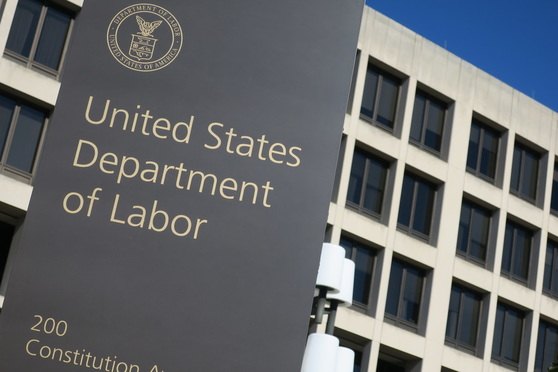New Claims Against Oracle Confront Prior Salary as Discrimination 'Pathway'
Workers rights advocates have long targeted the practice as perpetuating trends that keep minorities and women underpaid compared to male counterparts.
January 23, 2019 at 03:35 PM
5 minute read
The original version of this story was published on The Recorder
 Labor Department headquarters. Photo: Michael A. Scarcella/ ALM
Labor Department headquarters. Photo: Michael A. Scarcella/ ALM
New accusations against Oracle America Inc., facing private class claims and a U.S. Labor Department suit, target the tech company's use of prior salary as a practice that contributes to alleged workplace disparities among women and people of color.
The U.S. Labor Department on Tuesday, in the latest legal filing in its investigation into Oracle's pay practices, pinpointed the tech giant's use prior salary history—a common employment practice— as a “pathway” for discrimination. The document provides more details into lawsuit, filed in January 2017 at the end of the Obama administration, that suggest the company could owe as much as $400 million to minority and female workers.
The Labor Department's allegations come as the U.S. Supreme Court is poised to decide whether to take up the scope of the federal Equal Pay Act with a case that confronts whether salary history can be used to justify paying men and women separately for similar jobs.
Workers rights advocates have long targeted the practice as perpetuating trends that keep minorities and women underpaid compared to male counterparts. The U.S. Court of Appeals for the Ninth Circuit ruled against a California school district, and the case is now pending the justices' review at the high court.
➤➤ Get employment law news and commentary straight to your in-box with Labor of Law, a new Law.com briefing. Learn more and sign up here.
At Oracle, women, African-American and Asian workers are “systematically underpaid relative to their peers,” Laura Bremer, a Labor Department senior trial attorney, said in the court papers filed Tuesday. Bremer said this is based on many factors, including reliance on prior salaries and the company steering those employees to lower paid jobs.
“Oracle's suppression of pay for its non-white, non-male employees is so extreme that it persists and gets worse over long careers,” the Labor Department alleged. “Female, black and Asian employees with years of experience are paid as much as 25 percent less than their peers.”
The lawsuit was filed by the Office of Federal Contract Compliance Programs, or OFCCP, the Labor Department agency that enforces federal civil rights laws for government contractors. Workplace violations can threaten a company's federal contracts. Oracle earns roughly $100 million a year in government contracts.
A team from Orrick, Herrington & Sutcliffe, including partner Erin Connell in San Francisco and senior counsel Gary Siniscalco, represents Oracle. Siniscalco is co-chair of the firm's EEO and OFCCP compliance group.
Dorian Daley, general counsel to Oracle, disputed the Labor Department's complaint.
“This meritless lawsuit is based on false allegations and a seriously flawed process within the OFCCP that relies on cherry picked statistics rather than reality,” Daley said in a statement Wednesday. “We fiercely disagree with the spurious claims and will continue in the process to prove them false. We are in compliance with our regulatory obligations, committed to equality, and proud of our employees.”
Wage disparity cases against tech companies are increasingly common. Oracle is among the Silicon Valley technology companies in recent years targeted for wage discrimination. In a similar case, a judge last year certified a class action against Google, and cited the salary history practice as a method that bakes in lower pay for certain employees.
The Labor Department's latest move against Oracle comes as plaintiffs lawyers push for class certification on behalf of 4,000 women in a gender discrimination suit against Oracle in California state court. The plaintiffs alleged women make as much as $13,000 less on average than their male counterparts and receive smaller bonus and stock packages. The lawsuit does not target minority workers.
“There's no question that historically women have been paid less than men and using prior pay institutionalizes that,” said James Finberg, an Altshuler Berzon partner in San Francisco who represents employees suing Oracle and Google.
Finberg said Oracle's reported use of prior salary in setting compensation is “just one aspect of what we are arguing. The problem is not just that it created the disparity but they knew about it and didn't do anything to fix it.”
In California, relying on salary history is banned and a slew of states and cities have passed similar measures. Federal law is less clear on whether salary history falls in the scope of the Equal Pay Act, however.
The Supreme Court is weighing whether to consider the case Yovino v. Rizo. The Ninth Circuit, ruling for a California math teacher named Aileen Rizo, said her employer violated the Equal Pay Act when it justified paying her as much as $10,000 less than he male peers based on her prior salary. Business advocates such as the U.S. Chamber of Commerce have urged the court to reverse the Ninth Circuit, saying companies large and small, across the country, have “historically used prior salary as a metric to assess a range of matters.”
Appeals courts have interpreted questions over the use of salary history in varied ways. Many employment attorneys have in recent years advised companies to avoid asking job candidates about their previous salaries.
Read more:
New Case at US Supreme Court Tests Gender Pay Disparities
Pay Equity Disputes Are Flourishing, and Expect More in the New Year
Prior Salary Can't Justify Gender Wage Gap, En Banc Ninth Circuit Says
With Oracle Bias Suit, Tech Firms Feel Labor Dept.'s Unwelcome Gaze
This content has been archived. It is available through our partners, LexisNexis® and Bloomberg Law.
To view this content, please continue to their sites.
Not a Lexis Subscriber?
Subscribe Now
Not a Bloomberg Law Subscriber?
Subscribe Now
NOT FOR REPRINT
© 2025 ALM Global, LLC, All Rights Reserved. Request academic re-use from www.copyright.com. All other uses, submit a request to [email protected]. For more information visit Asset & Logo Licensing.
You Might Like
View All
Is 1st Circuit the New Center for Trump Policy Challenges?

Insurance Policies Don’t Cover Home Depot's Data Breach Costs, 6th Circuit Says

'Religious Discrimination'?: 4th Circuit Revives Challenge to Employer Vaccine Mandate
2 minute read
Standing Spat: Split 2nd Circuit Lets Challenge to Pfizer Diversity Program Proceed
Trending Stories
Who Got The Work
J. Brugh Lower of Gibbons has entered an appearance for industrial equipment supplier Devco Corporation in a pending trademark infringement lawsuit. The suit, accusing the defendant of selling knock-off Graco products, was filed Dec. 18 in New Jersey District Court by Rivkin Radler on behalf of Graco Inc. and Graco Minnesota. The case, assigned to U.S. District Judge Zahid N. Quraishi, is 3:24-cv-11294, Graco Inc. et al v. Devco Corporation.
Who Got The Work
Rebecca Maller-Stein and Kent A. Yalowitz of Arnold & Porter Kaye Scholer have entered their appearances for Hanaco Venture Capital and its executives, Lior Prosor and David Frankel, in a pending securities lawsuit. The action, filed on Dec. 24 in New York Southern District Court by Zell, Aron & Co. on behalf of Goldeneye Advisors, accuses the defendants of negligently and fraudulently managing the plaintiff's $1 million investment. The case, assigned to U.S. District Judge Vernon S. Broderick, is 1:24-cv-09918, Goldeneye Advisors, LLC v. Hanaco Venture Capital, Ltd. et al.
Who Got The Work
Attorneys from A&O Shearman has stepped in as defense counsel for Toronto-Dominion Bank and other defendants in a pending securities class action. The suit, filed Dec. 11 in New York Southern District Court by Bleichmar Fonti & Auld, accuses the defendants of concealing the bank's 'pervasive' deficiencies in regards to its compliance with the Bank Secrecy Act and the quality of its anti-money laundering controls. The case, assigned to U.S. District Judge Arun Subramanian, is 1:24-cv-09445, Gonzalez v. The Toronto-Dominion Bank et al.
Who Got The Work
Crown Castle International, a Pennsylvania company providing shared communications infrastructure, has turned to Luke D. Wolf of Gordon Rees Scully Mansukhani to fend off a pending breach-of-contract lawsuit. The court action, filed Nov. 25 in Michigan Eastern District Court by Hooper Hathaway PC on behalf of The Town Residences LLC, accuses Crown Castle of failing to transfer approximately $30,000 in utility payments from T-Mobile in breach of a roof-top lease and assignment agreement. The case, assigned to U.S. District Judge Susan K. Declercq, is 2:24-cv-13131, The Town Residences LLC v. T-Mobile US, Inc. et al.
Who Got The Work
Wilfred P. Coronato and Daniel M. Schwartz of McCarter & English have stepped in as defense counsel to Electrolux Home Products Inc. in a pending product liability lawsuit. The court action, filed Nov. 26 in New York Eastern District Court by Poulos Lopiccolo PC and Nagel Rice LLP on behalf of David Stern, alleges that the defendant's refrigerators’ drawers and shelving repeatedly break and fall apart within months after purchase. The case, assigned to U.S. District Judge Joan M. Azrack, is 2:24-cv-08204, Stern v. Electrolux Home Products, Inc.










